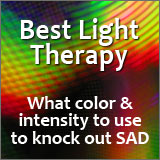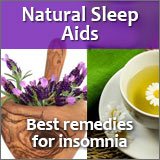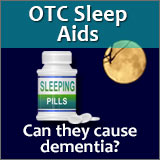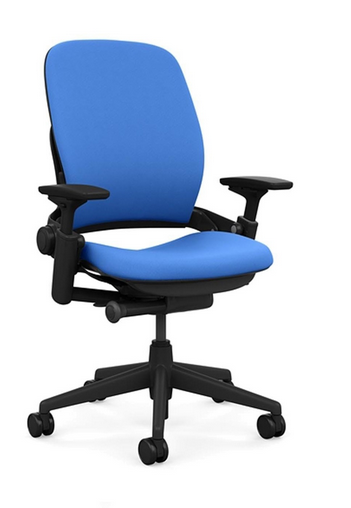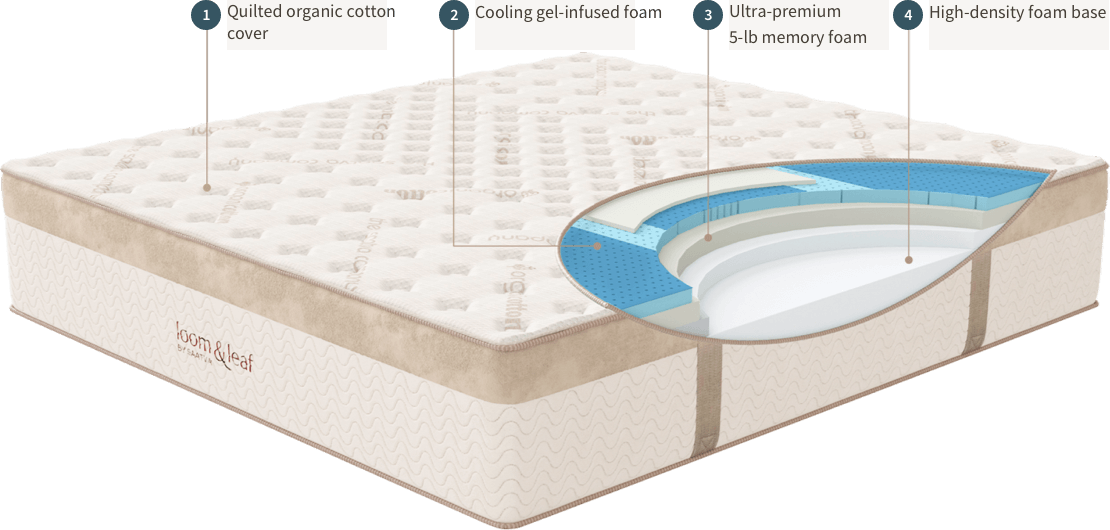Over the Counter Sleep Aids: 29 Nasty, Dangerous Side Effects
Over the counter sleep aids are a lot like war...easy to get started but tough to stop.
And one thing's for sure...Americans can't stop taking these often dangerous sleep drugs.
The main non prescription sleeping medications are Unisom, Benadryl, Sominex, Sleepinal, Nytol, Tylenol PM, Advil PM, Nyquil, Motrin, and other store-name brands.

Adults and children (12 and over, if you read the warning labels from the drug companies) are downing over the counter sleep aids (otc sleep aids) like they're candy.
To the tune of $100 million or more per year in sales for the pharmaceutical companies.
The point is not whether these otc sleep aids knock you out enough so you can get some sleep—and for some people, they do not.
The New Generation of Natural Sleep Aids
Now you can say “good riddance” to over the counter sleep aids. One of the top biochemists in the world has created a new generation of natural sleep aids for insomnia.
49 unique ingredients. It's packed with a combination of 49 specific ingredients. And they all work together to promote deep sleep.
For adults and children. Ideal for adults with insomnia. Plus, can be used by children 12 years and older because they do not contain melatonin.
Click here for information about these natural sleep aids... (Link opens in a new window.)
The point is this:
Over the counter sleeping pills are strictly for once in a blue moon use...for a couple of days or so.
Perhaps those occasional times when you have a short-term illness. A pulled muscle or backache that causes insomnia. Or those tragic moments in life where we lose a loved one and are overcome with grief.
I've been there and you probably have been too.
That said, if you take them long term...longer than a week—two weeks maximum...you are risking your health.
Including possible brain damage (see below for my article on OTC sleep aids and brain damage).
You may also be addicted. If not physically, then psychologically.
Face a cold dose of reality here...
If you need one of these over the counter sleep aids to get to sleep every night—or just two or three times a week, week after week—you've got a medical problem.
You need to see your doctor to get it resolved.
The real issue here is why do you need these drugs to sleep? Why aren't you tackling the root causes of insomnia you are dealing with?
And if you think you're getting refreshing, healthy sleep when you're on these drugs, you're living in a dream world.
When you take otc sleep aids, you're not really sleeping. You're not getting into the deep, restorative sleep that is necessary for vibrant health.
You've merely conked yourself out with a drug and your eyes are closed. It's the difference between swimming on top of the water versus diving deep in the ocean where the real life and exciting action is.
By the way, the active ingredients in otc sleep aids are either diphenhydramine HCL (it's pronounced dye fen HYE' dra meen), diphenhydramine citrate, or doxylamine succinate (pronounced doc SIL' a meen SUCK' si nate). These are all antihistamines.
Sometimes they also contain pain killers like acetaminophen and ibuprofen. Did you know that acetaminophen overdose is one of the most common poisonings worldwide, according to MedlinePlus?
Plus, if you try to stop taking these otc sleep aids, you are in for a rude awakening...
No pun intended. This is serious business here.
Have you ever asked yourself, “Gee, I hope there are no long-term effects from using these over the counter sleeping pills every week. Does anybody know if there are?”
Could very well be. Again, you should see my article below on otc sleep aids about dementia and brain damage. Researchers have some shocking information for you about that.
While you're worrying about long-term effects, how about the following:
Short-term effects that are already so bad for your health
People are popping pills day after day. Week after week. Month after month. Year after year of daily or almost daily swallowing of these over the counter sleep aids that can cause the following bad side effects:
- Addiction. The Food and Drug Administration (FDA) says
these sleep aids should not be used for more than two weeks. They
also say they are not habit forming.
Oh really? Then what about the untold numbers of people who have been using over the counter sleep aids for months? Even years. Let's deal with the real world here. - Withdrawal. So in answer to the question, "Can you get addicted to over the counter sleeping pills?" the answer is yes. The way to know is to stop taking them. More than likely, you will experience withdrawal. As I said before, if you've been taking these sleeping pills for a long time, you should discuss this with your doctor.
- Nausea.
-
Vomiting.
- Constipation.
- Skin rash.
- Appetite increase, weight gain, loss of appetite, or even anorexia. Here's a perfect example of why the FDA says, “[Over the counter sleep aids] affect people differently.”
- Hypotension (abnormally low blood pressure). This can be just as dangerous to your health as high blood pressure.
- Headaches.
- Blurred vision.
- Prostate problems.
- Liver toxicity. Some of the over the counter sleep aids contain the pain reliever acetaminophen as well as diphenhydramine.
- Morning hangover. There may be an inability to get out
of bed for work because you're too drugged up. (And what about getting a
12-year-old kid up for school after he or she downed one of these pills
the night before?)
- Daytime drowsiness and fatigue: This can lead to poor
work performance, as well as driving drowsy and causing accidents. The
FDA says: “They [over the counter sleep aids] don't completely stop
working after 8 hours—many people feel drowsy for longer than 8 hours
after taking them.”
There are 15 more disturbing side effects in part 2 of over the counter sleep aids. And they are even worse. Click the Part 2 link below the references to read them now.
References for Over the Counter Sleep Aids
- Side Effects of Sleep Drugs. FDA, US Food and Drug Administration, Consumer Updates.
- Drug Information Handbook, American Pharmaceutical Association
- Doxylamine Succinate, Drugs.com
- Noll Campbell, Malaz Boustani, et al. The Cognitive Impact of Anticholinergics: A Clinical Review. Clinical Interventions in Aging 2009:4 225–233.
- Some OTC, Cold Meds Could Harm Aging Brain. HealthDay Consumer News Service, 6/5/2009.
- Acetaminophen overdose, MedlinePlus, U.S. Library of Medicine
- Diphenhydramine, PubMed Health, National Institutes of Health, May 16, 2011
Here are more articles you may find helpful
Part 2: Do OTC Sleep Aids (Over The Counter) Cause Dementia and Brain Damage?
Sleep Medications: 7 Pros and 12 Cons of Taking Them
Return From Over the Counter Sleep Aids to Sleep Disorders Home Page



